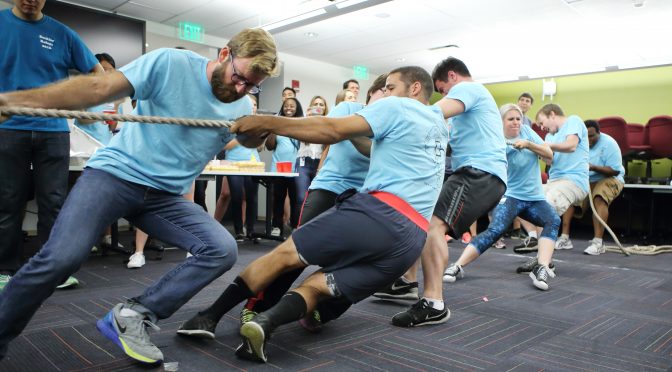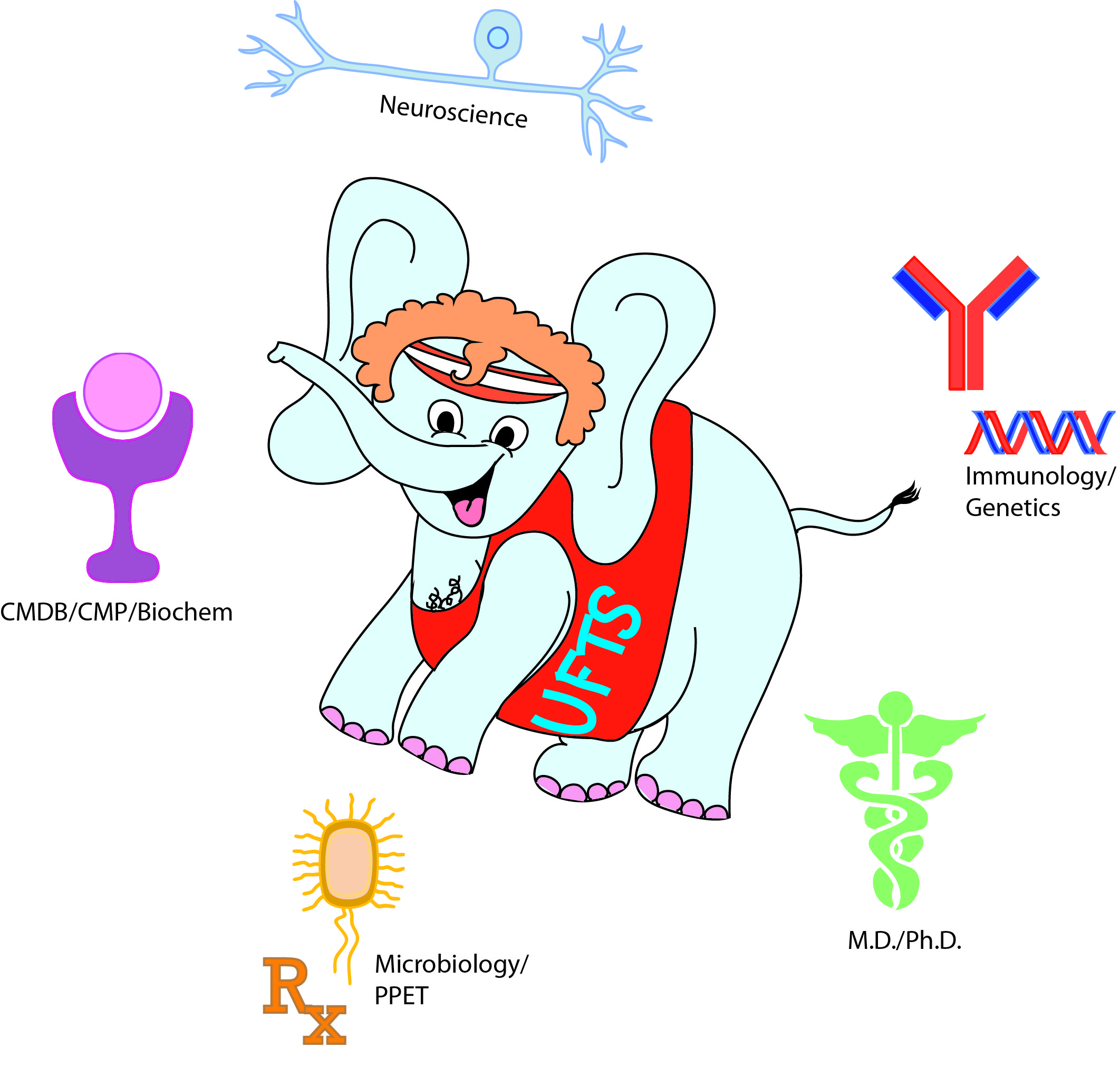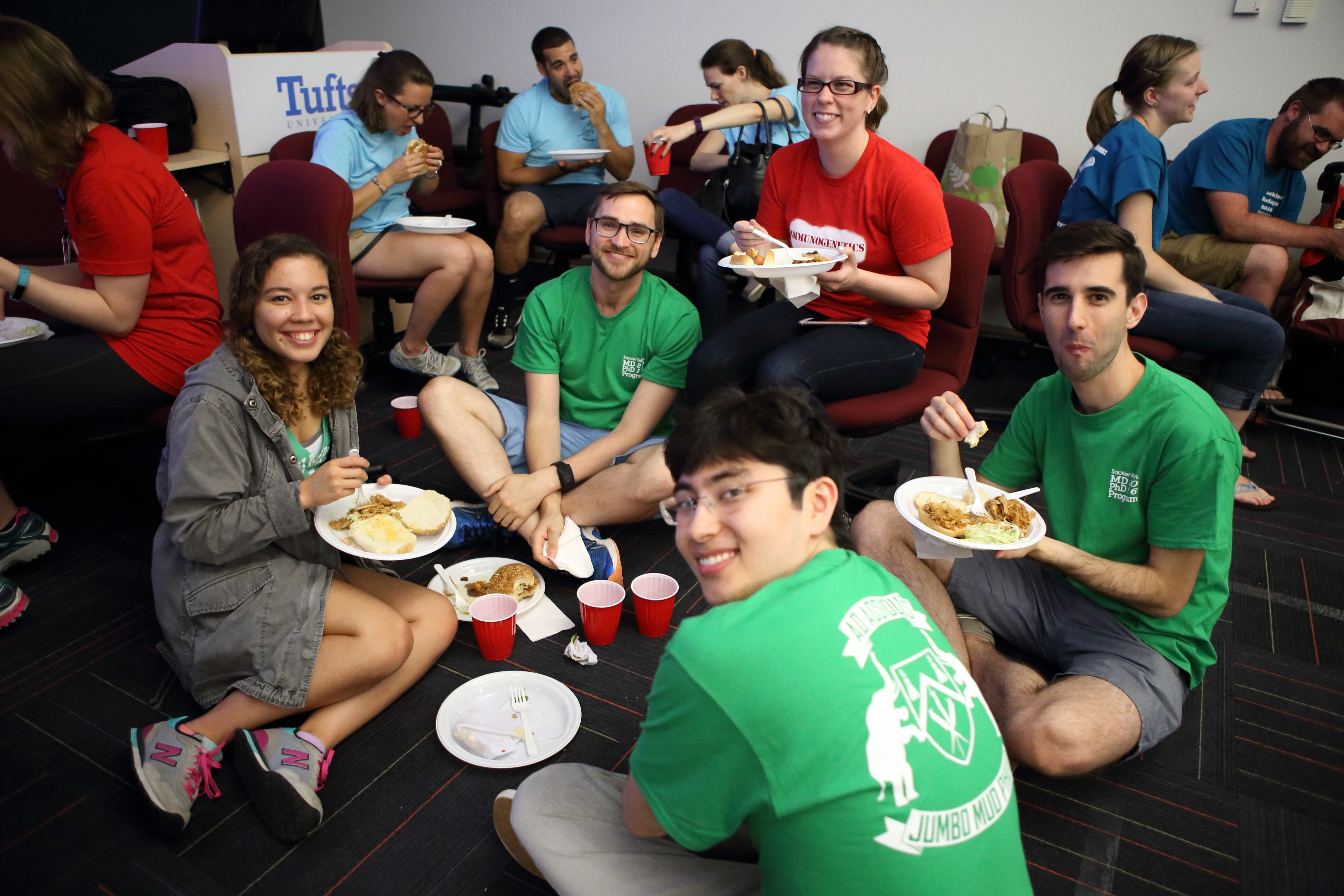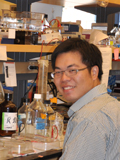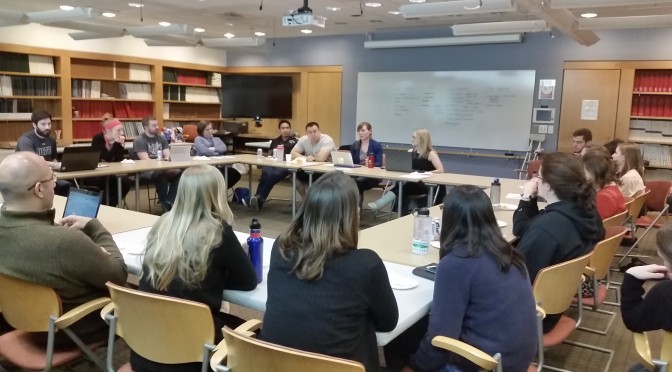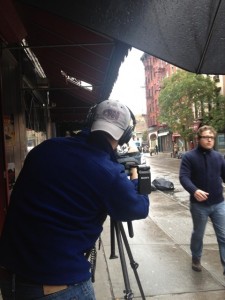This spring, two outstanding Sackler students–Bina Julian (PPET) and Jen Nwankwo (PPET)–were awarded the Tufts Presidential Award for Citizenship and Public Service. Established in 1999 by former university president John DiBiaggio, this award honors both undergraduate and graduate students who have shown substantial commitment to and achievements in building community through service and leadership. To highlight these accomplishments, we interviewed Bina and Jen about the work that led to their nomination and eventual awarding as well as what they do at the bench as well (note: at the time of publishing, Jen was out of town, thus we will update this article once we get a chance to talk with her).
Can you tell us about the work that led to you being nominated for this award?
Bina: I have a really strong desire to help people achieve their goals by increasing their self-awareness and connecting them with opportunities. And a parallel desire to figure out how to scale that impact when something works well…probably because I’m an engineer. That’s what drew me to the Tufts Biomedical Business Club (TBBC).
Our TBBC team runs like a small startup. From the beginning, we all saw the potential to connect Tufts students with professional resources, the Boston biotech community and each other. So we each went out and made connections [see Collaborator List] and designed ways for our members to learn and practice the business of science [see About TBBC]. Soon opportunities started coming to us, external groups reached out to collaborate, and our members were being recruited for jobs. I’m really proud of what we’ve built and how many people we’ve helped over the years.
Receiving this award especially acknowledges the work past and present TBBC leaders have done to shape TBBC into a sustainable and engaging training ground.
Box 1: Tufts Biomedical Business Club
TBBC is a way for researchers to gain industry awareness and professional development. Members get introduced to TBBC by attending our seminars featuring business leaders in several areas including venture capital (Bob Tepper, Third Rock), biotech startups (Sandra Glucksman, Editas), and consulting (Chris Von Seggern, ClearView). Many take a step further and participate in one of our self-guided initiatives, like Case Study Group, Biotech Journal Club, Biotech Buzz or hosting a speaker. Others gain critical business experience by competing in our Tufts New England Case Competition (TUNECC) or the Gordon Institute’s Tufts $100K New Ventures Competition. Regardless of whether or not our members become PIs, entrepreneurs or consultants, we hope their time with TBBC empowers them with the network and perspective to pursue a successful career.
Recent TBBC Connections
Internal Connections: TUSM Advancement Office, Sackler Graduate Student Council, Sackler Dean’s Office, Gordon Institute, Tufts Entrepreneurial Leadership Program, Tufts Center for the Study of Drug Development, Tufts Clinical & Translational Science Institute, Tufts Entrepreneurial Network (of student leaders), Tufts Entrepreneur Society (undergrad group), Tufts Institute for Innovation, Tufts MedStart, Tufts MD-MBA Program , Tufts Office of the Vice Provost Office, Tufts Postdoctoral Association, Tufts Tech Transfer Office, TUSM Public Health and Professional Degree Programs
External Connections: Venture Café, Biotech Connection Boston, Boston Entrepreneurs and Advanced Degree Meetup Group, Northeastern Biotech Entrepreneurs, Boston University BEST Program, Hopkins Biotech Network, MIT Biotech Group, Harvard Graduate Consulting Club, Yale Graduate Consulting Club
Guest speakers from: Back Bay Life Science Advisors, Biologics Consulting Group, Biomille, Brean Capital, BrightMed, Campbell Alliance, Center for Integration of Science and Industry, Bentley University, ClearView Healthcare Partners,Cowen and Company, Cyta Therapeutics, Decision Resources Group, Dyax Corp., Edits, Flagship Ventures, Foundation Medicine, Foundation Medicine, Genzyme, Google, Health Advances, LLC, Johns Hopkins Technology Ventures, LEK Consulting, MPM Capital, Novartis, NYU Entrepreneurial Institute, Polaris Ventures, Propel Careers, RA Capital, Simon-Kucher & Partners, T2 Biosystems, The Isis Group, Third Rock Ventures, Thomas, McNerney & Partners, Tufts Center for the Study of Drug Development, Tufts Gordon Institute, Tufts Institute for Innovation, Vaxess Technologies, Visterra, Inc.
How do you feel that your work connects to your current and future research/career goals?
Bina: I think it highlights the kind of impact I would like to have and scale up. I’d like my future career to bring together my skills as an engineer, a scientist, an educator and a “connector.”
What was the experience of being nominated like?
Bina: I actually had no idea I was being nominated. I have Jaclyn Dunphy and Julie Coleman to thank for going above and beyond to find this award and gather recommendation letters from current and former TBBC executives. When I got the award email and learned what they had done, I was incredibly moved and humbled.
[The Presidential Awards Ceremony took place on April 21st, 2016. Awards were presented by Tufts University President Anthony Monaco, Tisch College of Civic Life Dean Alan Solomont and nominators. Watch segments from the awards ceremony here.]
How would you like to see your work continued past your time at Tufts? How do you feel your efforts currently support that vision?
Bina: I hope that TBBC will continue to have an impact and that our connections within and outside of Tufts stay strong. It’s encouraging to meet engineering, policy, medical, dental, nutrition and even veterinary students at our events; they bring such different perspectives to our discussions and also connect Sackler students with opportunities happening at other institutions.
I hope future leaders extend TBBC’s mission with fresh ideas and diligently assess the needs of its members so TBBC stays relevant. Most of all I hope that future TBBC leaders make a conscious effort to not only hone their own leadership skills, but also invest in the professional development of their teammates.
The only way any of this vision will survive is if everyone gets involved – students, faculty, administration, alumni, and the biotech community at large. We’re a completely student run organization with a multi-year, personal commitment to produce high quality events and initiatives for our members. Whether its volunteers, event ideas, business workshops, speaker connections, conference discounts, alumni mentorship, job/intern opportunities and of course financial support – the executive team welcomes donations in all forms!
Last but not least, can you tell us about the work that you do in the lab?
Bina: I’m a Pharmacology and Experimental Therapeutics grad student working with Dr. Alan Kopin, who directs the Molecular Pharmacology Research Center at Tufts Medical Center. The Kopin lab studies G Protein-Coupled Receptors (GPCRs), a superfamily of 7-transmembrane receptors known for modulating a wide array of intracellular signals in response to extracellular stimuli. These cell receptors are considered highly “druggable” as they are targeted by nearly 40% of FDA approved drugs.
Cells use GPCRs to sense cues in their environment and make decisions. I study a GPCR subfamily of chemokine receptors, whose primary function influences decisions surrounding cell migration. My thesis work characterizes a rather understudied chemokine receptor called CCR6. Notably, CCR6 is highly expressed on and influences the migration of Th17 cells – an immune cell type whose aberrant recruitment to inflamed tissue is associated with several chronic inflammatory diseases. Many are interested in the therapeutic potential of CCR6, yet few tools exist to tease apart and modulate CCR6 receptor signaling.
In the lab I’ve developed molecular tools and assays that can enable screens to identify and characterize CCR6 modulators. Most recently I established a Bioluminescent Resonance Energy Transfer (BRET) assay to measure beta arrestin recruitment to CCR6. Most people know that GPCRs signal through G proteins as their name suggests, but they have an alternative pathway mediated through beta arrestin. The BRET assay allows me to observe dynamic protein-protein interactions with CCR6 and tagged signaling molecules. We are also interested in how naturally occurring variations in CCR6 affect signaling and if these alterations could predispose individuals to disease.
CCR6 plays a complex role in inflammation at the level of individual cell types and the field needs tools to tease apart its influence. And unlike the reputation of its GPCR superfamily, chemokine receptors have had little drug development success (only one FDA approved compound modulates the migratory function of its chemokine receptor target). Overall I hope the insights from our study of CCR6 variants as well as the genetic constructs and assays we’ve developed can be used by both immunologists and pharmacologists to translate this work to help patients.

